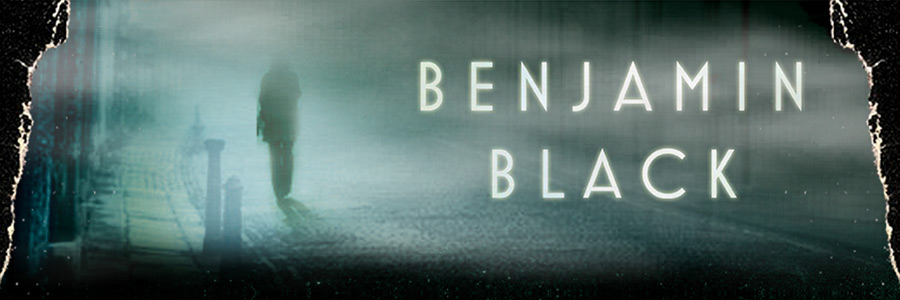

John Banville
When I decided to try my hand at noir fiction, I realised at once that Dublin in the 1950s would be the ideal setting. All that dinginess, that fog and coal-smoke, those misty mornings and rain-washed twilights, those heartbreakingly lovely silver-grey evenings along the canal bank between the humped, granite bridges; all that furtiveness, that covert sinning; all that despair, all that guilt-what more could a crime writer ask for?
In those days, Dublin for me was a distant bright glow in a generally overcast sky. I was born, in 1945, in Wexford, a little Irish seaport town situated in what is known as the Sunny South-East, a description that used to provoke mirth among locals, and probably still does. I grew up in a temperate climate, in tranquil times, or at least so it seemed. Life in Ireland was slow, unsusceptible to change, pleasant sometimes, boring always. When I look back now to what was then I might be seeing scenes from Breughel, or Jack B. Yeats at his most primitive. The wars of the Counter-Reformation had long ago ended in Europe, but in Ireland the last one of them had not even begun yet.
Ireland in the 1950s was still held fast in the grip of tradition. Although we did not know it, and would have been shocked to think it, our conditions were very like those in the Eastern Bloc countries. The State, backed by an iron ideology—Irish Catholicism is a special case of the Roman faith—ruled over us absolutely; all protest was futile, all dissension was punished. Sinners and misfits alike were sent into exile. Inconveniently free-thinking writers were forced to go abroad or be silent; recalcitrant boys were locked away in Industrial Schools; girls who got pregnant "out of wedlock", as it was quaintly put, were sent to work—to slave, really—in laundrys run by nuns, and when their babies were born they were taken away from them and put in orphanages, here and abroad. These were the realities of life on this right little, tight little island.
Of course, some had it good-there is always a nomenklatura. Men of the middleclass establishment, politicians, doctors, lawyers, captains of industry, were free to conduct their lives as such people do everywhere, so long as they were discreet and observed the public pieties. For the rest of us, the stuff of life was a thin gruel indeed. In the 1970s a right-wing politician famously complained that "there was no sex in Ireland before we had television"—our first TV station started up in the early 1960s—and while everyone scoffed, in our hearts we knew exactly what he meant.
When I was growing up, Sunday newspapers from England would have blank squares where the Fleet Street printers had removed advertisements for contraceptives, for if the ads had been left in, the papers would have been impounded by Irish Customs. A few years ago I was walking down O'Connell Street in Dublin and saw before me a double-decker bus entirely painted over with an advertisement for Durex condoms. Times do change-not always entirely for the better, and often at the expense of good taste.
Murder was a rare occurrence here in the 1950s. The country was held enthralled for months by the case of an Indian medical student in Dublin who got an Irish girl pregnant, strangled her, and cut up her corpse and fed it into the furnace in the basement of a restaurant where he had a part-time job. Even Wexford was not without its grisly glories: we were horribly thrilled when the owner of a sweet-shop in Cinema Lane was bludgeoned to death one black winter night by an intruder who was never brought to justice, though everyone knew his identity. The thought of all that blood spilled among the toffee bars and the bottles of bull's-eyes was deliciously shiver-inducing. Oh, we were shocked by such excesses, of course, but as George Orwell pointed out in his essay The Decline of the English Murder, we all like nothing better than a good, juicy homicide.
Dublin in those days was a rackety town, a "relic of oul dacency", as we would have said. What had once been the second city of the United Kingdom was now, in Republican times, much reduced. An aunt of mine lived there, in a vast, leaky apartment in a Georgian house on Upper Mount Street, just up from Government Buildings, one of the handsomest eighteenth-century thoroughfares surviving in the city and, in those days, the well-worn beat for what must surely have been Europe's unloveliest contingent of whores. When I came to write Christine Falls I gave that apartment to my protagonist, Quirke. The house is now a solicitor's offices, and from the outside, at least, seems just as run-down as it was forty-five years ago, when I inherited the apartment from my aunt and moved in, thinking myself a ready-made cosmopolitan. Quirke lives the life that I wanted in those days: he is well-heeled, independent, handsome, fascinatingly troubled and seemingly irresistible to women. Even his woes are enviable. And Dublin is his town, as it was never quite mine, and as it is not quite mine even yet. But then, Quirke's Dublin is a Dublin of the imagination, and what real city can live up to its imagined shadow version?
end

